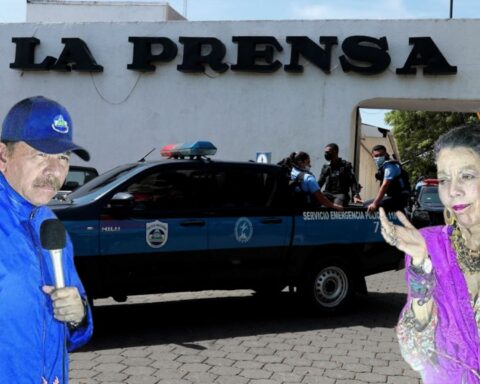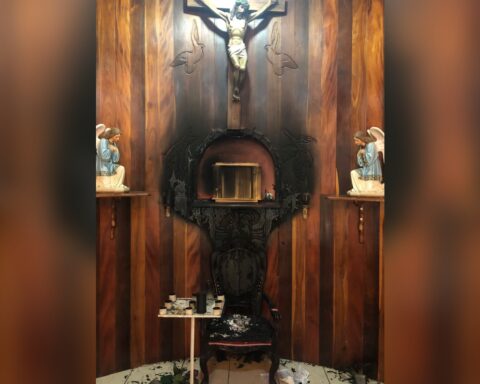The lawyer and former diplomat Mauricio Díaz Dávila, 71 years old and national director of the Ciudadanos por la Libertad (CxL) party, was sentenced this Wednesday by Ortega judge Luden Quiroz García, in charge of the Ninth Criminal District Court, for allegedly “ conspiring to undermine national integrity”, under Law 1055 or “Sovereignty Law”. Ortega justice also confirmed the sentence against prisoners of conscience Miguel Mendoza and Nidia Barbosa, sentenced last week.
The Prosecutor’s Office of the Ortega regime requested nine years in prison plus disqualification from holding public office, although it was unable to prove the fabricated crime, in the marathon trial of a single hearing, held at the facilities of the Directorate of Judicial Assistance, known as El Chipote .
The evidence presented by the Ortega Prosecutor’s Office included testimonies from National Police officers; detectives and computer experts, and videos of interviews that the prisoner of conscience granted to the media outlets Canal 10 and 100% Noticias, where he gave “political criteria” on the situation in the country.
Díaz declares himself “innocent” before the Ortega justice
In the few minutes that the Ortega justice granted Diaz to express himself during the trial, the former diplomat declared himself “innocent” and stressed that he has always been “an honest, transparent person who has never asked for external financing or conspired against his country.” He also sent word to his family that “as long as God does not condemn me, let man condemn me.”
Human rights defenders consulted by CONFIDENTIAL They pointed out that, despite the allegations and fabricated evidence against Mauricio Díaz, the Prosecutor’s Office never managed to prove the crime for which he is accused, highlighting that the prisoner of conscience “has not committed any crime and all his actions have been protected by the Constitution Politics and the fundamental rights that every citizen has”.
The reading of the sentence against the former diplomat, according to sources consulted by CONFIDENTIALIt will be next February 24.
Physical and psychological deterioration
Díaz Dávila, who served 71 years imprisoned in El Chipote, was arrested on August 9, 2021, after being violently captured by a group of National Police officers who intercepted him, beat his son and the lawyer who accompanied him, after testifying before the Ortega Prosecutor’s Office.
The confinement of more than 190 days to which he has been subjected has deteriorated the physical and psychological health of the political prisoner. His relatives have denounced that inside the cells of El Chipote he has fainted, has mental blackouts and spots on his skin as a result of the few hours of sunlight he is authorized.
The lawyer is recognized nationally and internationally for his long diplomatic career; He was the Nicaraguan ambassador to Costa Rica, during the governments of Arnoldo Alemán and Enrique Bolaños, and before the Organization of American States (OAS) between 1999 and 2000.
Confirm sentence for Miguel Mendoza and Nidia Barbosa
The Ortega justice also issued this Wednesday the sentences of nine and the disqualification to hold public office, against the journalist Miguel Mendoza, sports writer and blogger; and eleven years in prison and the same restriction for public office against the opposition Nidia Barbosa, a member of the Civic Alliance for Justice and Democracy (ACJD).
Both were sentenced last week for alleged “conspiracy to undermine” society and the State of Nicaragua based on the “Sovereignty Law.” Barbosa was also sentenced, at the hands of Ortega judge William Howard López, in charge of the Masaya Criminal District Court, for allegedly “spreading false news”, under the “Special Cybercrime Law”.
Relatives of both prisoners of conscience have reiterated the innocence of their relatives and demanded their immediate release. In addition, they have denounced the physical deterioration caused by the months of unfair confinement to which they have been subjected. The Nicaraguan Center for Human Rights (Cenidh), through social networks, has ruled on both trials, expressing that they are “a farce” carried out “without scruples” by the Judiciary.
Trials in El Chipote violate the law
The political trials reactivated by orders of Daniel Ortega have been scheduled for the entire month of February against political prisoners, in the same “El Chipote” facilities, where dozens have been imprisoned since the end of May 2021.
However, carrying out these processes in the prison facilities constitutes one more of the illegalities of due process, according to the specialist in Criminal Law, María Asunción Moreno, in an interview with Tonight.
Lawyers who closely follow the cases against political prisoners agree with Moreno that judges cannot hold hearings outside the Judicial Complex, and that the exceptions established in article 121 of the Criminal Procedure Code only apply to “proceedings” that require the presence of the judge in his territorial jurisdiction.
However, they maintain that the exception does not apply in the case of these political trials, because neither the defense nor the Prosecutor’s Office have requested that they be held in “the new Chipote,” the lawyer said.
The right to defense is violated
Another of the illegalities is that the defenders of political prisoners have not accessed their files – completely or partially – and they have not been able to talk freely with prisoners of conscience.
A lawyer who monitors political trials assured CONFIDENCIAL that in these processes the exercise of technical and material defense is being violated, contrary to article 124 of the Code of Criminal Procedure (CPP), which establishes that “the parties may obtain their cost simple copies of the judicial proceedings without any paperwork”.
Also, he added, article 34 of the Political Constitution of Nicaragua is violated, which in its numeral 4, demands that “their intervention and due defense be guaranteed from the beginning of the process or procedure and to have adequate time and means for their defense ” .
In addition, this January 31, the Public Ministry violated the presumption of innocence of political prisoners, by calling them “criminals and delinquents” in a statement announcing the resumption of trials.
“These same criminals and delinquents have reoffended, attacking the rights of the Nicaraguan people and society, compromising peace and security. They are the same ones that promoted and directed the terrorist acts of the failed coup attempt of 2018, having paralyzed the country and created damage to the economy; They are the same ones that have caused so much pain and mourning in the Nicaraguan family because of the murders, torture and kidnappings,” he published.
Likewise, Ortega already condemned the political prisoners on November 8, in his most virulent speech against political prisoners, in which he called them “sons of bitches of imperialism.”
They demand the release of political prisoners
The Ortega regime keeps more than 170 Nicaraguans imprisoned, and more than 30 of them remain in “the new Chipote”, under isolation, in punishment cells, suffering physical and psychological torture, according to their relatives, who have only managed to visit them on five occasions during the more than six months of confinement.
Relatives of more than 30 political prisoners They demanded, at the end of January, the annulment of the trials and the unconditional release of all prisoners of conscience. In this way, they joined a previous statement, in which another group of relatives appealed for the support of “rulers, living forces of the nation and (Catholic) Church” so that they “lead” a “citizen unification process”, emphasizing that the release of prisoners of conscience would serve “as a kind of liberation shared by all Nicaraguans.”
After the communiqués, the Superior Council of Private Enterprise (Cosep), which had been silent since September 2021, supported the demand for the freedom of prisoners of conscience, and announced its willingness in favor of a national dialogue “without preconditions”, in in the midst of the worst legitimacy crisis of the Ortega regime, which previously announced meetings with different economic sectors, without mentioning COSEP.
Among the 39 political prisoners captured between May 28 and October 21 (including four under house arrest), 29 are accused of alleged conspiracy to undermine; another seven are accused of money laundering and other crimes; two are investigated for violations of the “Law of Sovereignty” and one for abusive management and improper appropriation and retention.
The regime has used against the opposition the package of repressive laws that they approved between October 2020 and February 2021, being the most used until now, Law 1055 or Law for the Defense of the Rights of the People to Independence, Sovereignty and Self-determination for Peace, better known as the “Sovereignty Law”, which facilitated the imprisonment of seven presidential candidates, as well as political, civic, student, peasant, former diplomat, journalist, activist, professional and human rights defender leaders.
He has also used the Special Cybercrime Law, known as the “Gag Law”approved on October 27, 2020, which penalizes whoever -according to the regime’s criteria- spreads “false news”.
Thus, the Prosecutor’s Office sentenced in January Donald Margarito Alvarenga Y Douglas Cerros Lanzas. Alvarenga was convicted of allegedly inciting “hate and violence” through Facebook posts and WhatsApp messages and for “subversion, disobedience and rebellion at the level of conspiracy to affect national integrity”; and Cerros for allegedly undermining national integrity and spreading false news.








